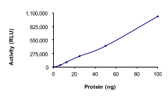
DGKA, Active (D21-10BH)
FOR BULK ORDER REQUESTS PLEASE CONTACT US
Description :Recombinant full-length human DGKA was expressed by baculovirus in Sf9 insect cells using an N-terminal His tag.
Species :Human
Tag :His tag
Expression System:Sf9 insect cells using baculovirus
Sequence :Full length
Genbank Number :NM_001345
Specific Activity :Sample Kinase Activity Plot. For specific information on a given lot, see related technical data sheet.
Purity :Sample Purity Data. For specific information on a given lot, see related technical data sheet.
Storage, Stability, and Shipping :Store product at –70oC. For optimal storage, aliquot target into smaller quantities after centrifugation and store at recommended temperature. For most favorable performance, avoid repeated handling and multiple freeze/thaw cycles.
Applications :Kinase Assay
Molecular Weight :82 kDa
Gene Aliases :DAGK; DAGK1; DGK-alpha
Scientific Background :Diacylglycerol kinase alpha (DAG kinase alpha) is a member of the eukaryotic diacylglycerol kinase family. Upon cell stimulation converts the second messenger diacylglycerol into phosphatidate, initiating the resyn-thesis of phosphatidylinositols and attenuating protein kinase C activity. Involved in hepatocellular carcinoma progression through regulation of the Ras/Raf/MEK/ERK pathway. The DGKα/atypical PKC/β1 integrin signaling pathway is required for matrix invasion of breast carcinoma cells.
References :
1. Takeishi, K. et al. (2012). Diacylglycerol kinase alpha enhances hepatocellular carcinoma progression by activation of Ras-Raf-MEK-ERK pathway. J. Hepatol. 57, 77–83.
2. Rainero, E. et al. (2014). The diacylglycerol kinase alpha/atypical PKC/beta1 integrin pathway in SDF-1alpha mammary carcinoma invasiveness. PLoS ONE 9:e97144.
3. Sakane F, et al. (2016). Diacylglycerol Kinases as Emerging Potential Drug Targets for a Variety of Diseases: An Update. Front Cell Dev Biol. 4:82.
Product Sheets (By Lot #) :
Research Areas :Apoptosis/Autophagy, Cancer, Cardiovascular Disease, Cell Cycle, Inflammation, PKA/PKC Pathway
